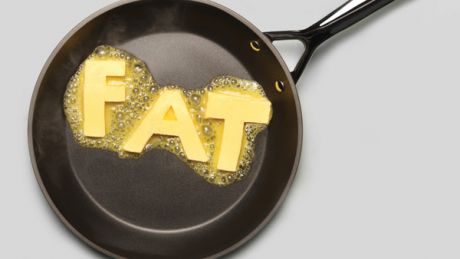The truth about fat
We’re fed an awful lot of information about fat. Here’s what you really need to know about this crucial element of our diet

For years experts have been telling us fat is bad for us but it’s now evident that fat is an absolutely essential part of the human diet – even for those who are trying to shed body fat. Personal trainer William Smith explains what different types of dietary fat do and exposes the myths that surround this vital nutrient.
TYPES OF FAT
Unsaturated fat
There are two types. Polyunsaturates are mostly found in nuts, seeds, fish and leafy greens and are best eaten in these whole foods, since certain sorts of processing can damage them and turn them into harmful trans fats. Monounsaturates are the main component of most cooking oils, nuts and avocados, and are widely acknowledged to be one of the healthiest fats.
Saturated fat
These are typically found in animal products such as milk, butter, cheese, cream and meat. High consumption of saturated fat has long been associated with high levels of cholesterol and some types of cancer. The FSA and World Health Organisation have recommended that people reduce their consumption of them, although many experts are challenging this view.
Trans fat
Get the Coach Newsletter
Sign up for workout ideas, training advice, reviews of the latest gear and more.
This is basically the popular name for unsaturated fat with trans-isomer fatty acids, created through some complicated scientific processes. Unlike other forms of fat these are not essential to the diet and can increase the risk of heart disease and raise ‘bad’ cholesterol while lowering ‘good’ cholesterol. They’re not found in natural foods.
FAT MYTHS
‘All fat is bad for you’
No natural fat is inherently bad for you. Natural fats have been shown to increase brain function and growth and development. They are also high in antioxidants which fight off damaging free radicals in the body and maintain HDL (‘good’) cholesterol levels. The fats you do need to avoid are trans fats because they increase visceral fat levels – the fat around your organs – and this is linked to type 2 diabetes together with a number of inflammatory and cardiovascular diseases. These are most commonly found in takeaways, deep-fried foods, pastries and pies.
‘Something with a “fat free” label is good for you’
Many of the products on which you will see this label (milk, yoghurt, cheese and spreads) will have had all or most of their natural fat removed and replaced with sugar, salt and artificial sweeteners. These will raise blood sugar levels and spike your energy levels. Stick to the organic, natural full-fat options to protect your health.
‘Saturated fat is the worst kind of fat’
There is little compelling evidence that this naturally-occurring fat found in animal products causes ill health or increases body fat, and a lot to indicate it protects your wellbeing. Studies have shown that a balance of all the fats gives cell membranes their structure and boosts your body’s natural anti-inflammatory abilities. Fat should make up around 30% of your total calorie intake so aim for 10% polyunsaturated, 10% monounsaturated and 10% saturated.
‘Carbohydrates are a better source of energy’
Fat provides the largest concentration of energy supply of any macronutrient. The amount of fat we can store is far greater than other food types and because it takes longer to be converted into energy it will keep you powered up during the later stages of endurance training, so it's a great source of energy for marathon runners. Fat also helps transport the essential vitamins A, D, E and K through the bloodstream, which will improve performance and recovery.
William Smith of Innov8 Fitness is an experienced personal trainer and contributor at supplements company Bodybuilding Warehouse.
For more expert advice, subscribe to MF - we'll give you five issues for £5. You can also download a digital version of the latest issue from iTunes.
